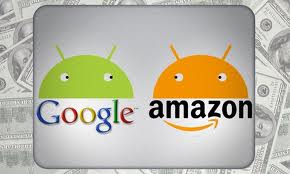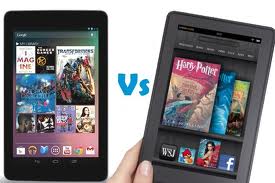![]()
Think of it as Rocky versus Apollo, Luke Skywalker versus Darth Vader, Rocky versus Bullwinkle (wha?).
You can equate those match-ups with the likes of this recent upsurge of online content media commercial mayhem with the indomitable superstar of the online superstore: Amazon.
There’s a prodigy in the midst, though (Rocky, Skywalker, and, uuuhh…. Rocky). And that’s Google Play (formerly known as the generic “Android Market”).
Just imagine any auto attendant for a small business licking their lips at this battle royale of the digital world, because these places have become the universal hub for purchasing and new small business enterprise. Think apps galore. Apps to the extreme. Products sold to the masses in droves without any expense of gas, walking legs, and waiting in long lines for the next Harry Potter book or Avengers movie.
This is the stuff small businesses are made of! Convenience, the advent of supreme business technology (devices, wireless, streaming, purchasing online), and total efficiency. There’s just one question, though….
Which Is Better? Google Play or the Kindle Store?
Hold off here, though. We’re forgetting the granddaddy, the Abraham Lincoln, the President Obama (or President Romney if you’re Republican) of online media content purchasing — iTunes. Let’s face it: Apple pioneered the idea of purchasing stuff online. But let’s be fair here —
iTunes may have the most massive collection of material to purchase — music, movies, books, everything — but we’ve got to focus on X-factors here. A focus on media world domination (Amazon) and one of the upcoming major players in the digital distribution arena (Google).
Apple may have the major hand in computer technology, but when it comes to commercial collectivism, Amazon for sure has the upper hand. And Google? Online technology basically belongs to Google. So let’s just focus on Google and Amazon, shall we? We can tackle iTunes later….
Shopping in the Kindle Store
Small businesses would definitely see this as an advantage: complete compatibility. Because Amazon isn’t necessarily bound by a specific type of technology (iOS, iPod, iPad, Android, yadda yadda yadda), you’re looking at an online store capable of streaming, renting, purchasing and implementing without any worry about whether or not your device — your business smartphone, your corporate tablet, your everyday company desktop or laptop, even a Nintendo Wii or XBOX if you wanted — will be compatible with your product or purchase.
It’s affordable. It’s gargantuan. Amazon focuses on making things available. And sometimes that’s what businesses look for.
Not to mention Amazon has just about anything and everything you could possibly need for your business. Not just apps, but materials. And even for small businesses and constantly mobile entrepreneurial corporations, many materials are necessary to run the business well.
It’s not so much about technology. It’s about distribution.
So What About Google Play?
That’s a tough call. Google? You can’t deny that they’re a mega-giant of the internet universe. But can they really stand up against Amazon? Possibly. Only time will tell.
The thing is Google Play is relatively new to the online content and media purchasing and renting business. But they’re certainly putting their stamp onto the field.
Everything from business apps, game apps, desktop apps, movies, books, music. Google Play has it all. The thing is this: you better be dedicated to Android, or you’re stuck. Android, of course, is Google’s flagship operating system. Get a tablet or phone utilizing the Android technology, and you’ll be just fine.
 They don’t, however, have as much content as Amazon, obviously — but they’re getting there. Google’s capable. But can they transcend to that distribution and availability spectrum?
They don’t, however, have as much content as Amazon, obviously — but they’re getting there. Google’s capable. But can they transcend to that distribution and availability spectrum?
Know Your Business
I have to say — this isn’t a review for whether or not Google Play could beat out Amazon or vice versa. Rather, I stamped this a 4 star rating because this is simply about the entire market as a whole.
It’s competitive. It’s lively. And that’s a good thing. I’d give it five stars if it wasn’t for the fact that low prices always seems to be the driving factor for these competitors, and while that’s great for us business folk out there vying for such content, it’s not so good for those selling it.
As with any field of business or industry, changes are evident. How the industry handles those changes, and how strong the industry happens to be before all of those changes? That determines whether or not those changes will be for the worse. Or for the better.
Related Keywords: information technology, communication, cloud computing